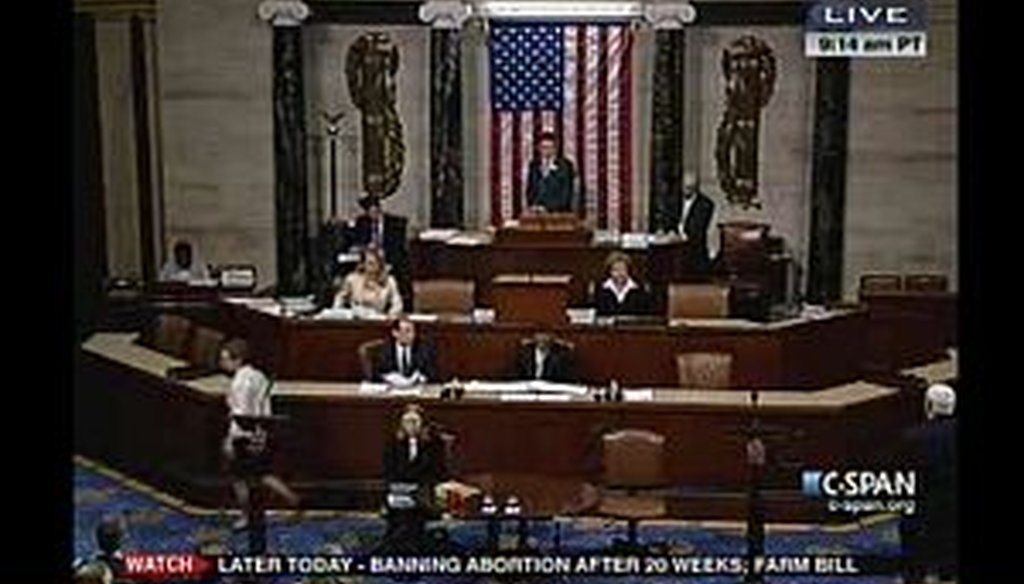Get PolitiFact in your inbox.

The U.S. House of Representatives begins debate on a bill limiting abortion.
Partisan debate about pregnancy and rape re-emerged last week with a bill that would ban abortion 20 weeks after fertilization, when some researchers say fetuses are capable of feeling pain.
H.R. 1797 heads to the House floor today with narrow exceptions — added by House leaders — for incest and for rape.
A woman would need to report her rape to the "appropriate enforcement authorities" to be allowed an abortion at 20 weeks or more after fertilization — commonly known as 22 weeks of pregnancy — with a jail sentence for providers who violate the ban.
The bill’s sponsor, Rep. Trent Franks, R-Ariz., argued last week that the rape exception wasn’t necessary because "the incidence of rape resulting in pregnancy are very low."
Democrats accused him of a Todd Akin moment — though it wasn’t at all clear what Franks meant to say.
"I just find it astonishing to hear a phrase repeated that the incidence of pregnancy from rape is low. That is not — I mean, there is no scientific basis for that," said Rep. Zoe Lofgren, D-Calif.
Akin, a former Republican representative from Missouri, lost his bid for a Senate seat after claiming in summer 2012 that victims of "legitimate rape" rarely get pregnant. ‘"From what I understand from doctors, that's really rare," Akin said. "If it's a legitimate rape, the female body has ways to try to shut that whole thing down." Akin soon apologized and said he was wrong.
Franks, during the committee debate June 12, 2013, in which he made the comment, suggested he meant something entirely different from Akin’s remarks, at one point telling a Democratic colleague he "never made such a suggestion."
"Just to make clear my point earlier, pregnancies from rape that result in abortion after the beginning of the sixth month are very rare," he said.
Still, Franks’ comments and the response from Democrats prompted us to round up the research. What do researchers say about pregnancy and rape?
As one 2003 study pointed out, there’s "enormous methodological inconsistency" on what constitutes an act of rape, the ages of victims studied, and whether women took emergency contraceptives.
Research in the 1970s, ‘80s and ‘90s generally calculated rape-pregnancy rates between 1 percent and 5 percent, with the most broadly quoted estimates around 2 percent, according to the article in the journal Human Nature. By comparison, a woman’s chance of getting pregnant from a single act of intercourse is about 3.1 percent, according to a separate 2001 study in the journal Contraception.
Researchers in the Human Nature study, which examined evolutionary theories of human rape, focused on women of reproductive age who were victims of penile-vaginal rape and adjusted for the use of contraception. They calculated that a given instance of rape may actually be more likely to result in pregnancy than an instance of consensual sex. (They argue this may be the case from an evolutionary perspective, because rapists control their choice of victims, and may prefer women who are fertile and ovulating.)
Meanwhile, results from a 1996 American Journal of Obstetrics and Gynecology study help explain the differing language on pregnancy from rape.
Its study of 4,008 women of reproductive age turned up 34 cases of rape-related pregnancy resulting in a rate high enough for researchers to conclude that "rape-related pregnancy occurs with significant frequency."
It calculated a rape-related pregnancy rate of 5 percent among victims of reproductive age, suggesting more than 32,000 pregnancies result from rape a year.
Franks might call that number, among millions of U.S. pregnancies, low. As a rate of pregnancy resulting from an act of intercourse, it’s high.
Our Sources
House Judiciary Committee, transcript of markup of H.R. 1797, June 12, 2013
Library of Congress' Thomas, H.R. 1797, "District of Columbia Pain-Capable Unborn Child Protection Act," accessed June 14, 2013
CQ, "HR 1797 — District of Columbia Pain-Capable Unborn Child Protection Act," accessed June 14, 2013, subscription only
Washington Post's Fact Checker, "Interpreting remarks on abortion," June 17, 2013
Fox2 Now St. Louis, "Jaco Report: Full Interview With Todd Akin," Aug. 19, 2012
CBS News, "Akin apologizes for rape comments; Obama says 'rape is rape,'" Aug. 20, 2013
American Journal of Obstetrics and Gynecology, "Rape-related pregnancy: estimates and descriptive characteristics from a national sample of women," August 1996 (Full text on Scribd via Washington Post)
Contraception, "Likelihood of conception with a single act of intercourse: providing benchmark rates for assessment of post-coital contraceptives," April 2001
Human Nature, "Are per-incident rape-pregnancy rates higher than per-incident consensual pregnancy rates?" 2003














































